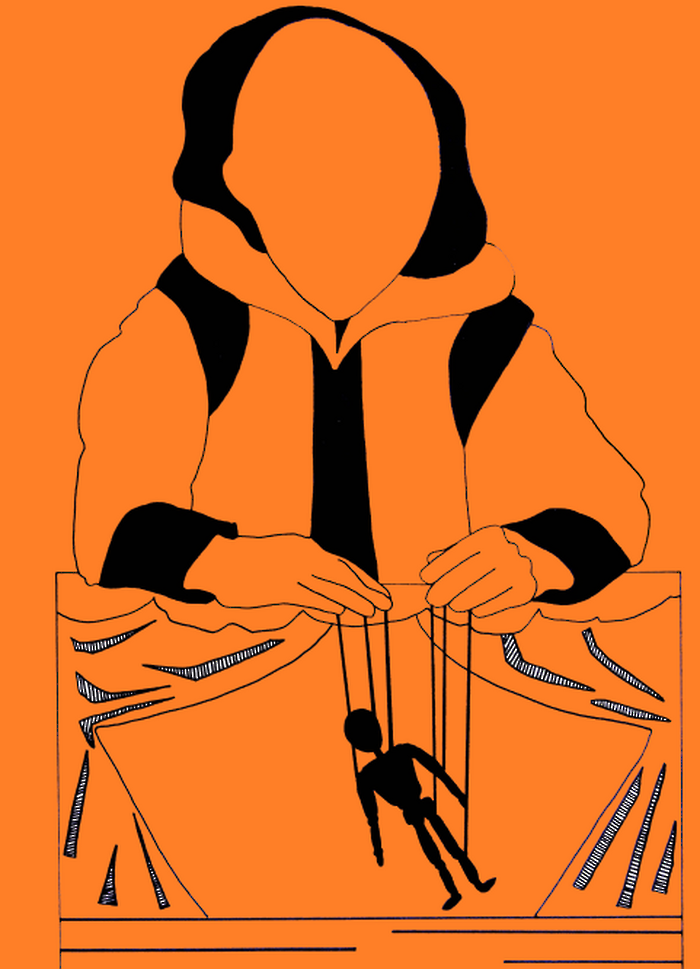Panoptikos review
A student-written study in voyeurism and misery is engagingly brought to life by talented actors, only slightly hampered by its muddled themes and pacing issues

Surveillance, control, 1984, image obsession. Did you know Britain has one of the largest totals of CCTV cameras in the world? These tropes are played out so often in media they feel tired and hackneyed- it’s a familiar criticism levelled at Charlie Brooker’s hit TV show Black Mirror. Panoptikos, directed by Atlanta Hatch, manages to make these issues seem fresh by integrating them in a universally recognisable tale of family breakdown.
"This is a stylish reminder of our tendency towards morbid fascination with strangers’ misfortune that is amplified with surveillance technology"
Panoptikos asks: how far would you go to control your image? What would drive you to lose control? Amy Heffernan tenderly plays Ava, a soft woman with an iron grip on her life and her thriving GP practice on the brink of expansion. At times Heffernan doesn’t truly take ownership of her role, overshadowed by other actors but as the play progresses she’s more and more comfortable as Ava’s vulnerability is exposed. Outwardly a perfect life, the cracks show early as her husband (the excellent Harry Vincent) and her daughter (Hannah Mitchell) chafe against Ava’s emotional neglect. Originally meant to do Medea, Hatch and assistant-director Lottie Reader instead staged something that bridges the chaos of a Greek tragedy with the very modern idea of being constantly on show- the audience as the all-seeing eye of the play’s name. The script steadily careers towards disaster, as control-freak Ava is forced to watch her carefully constructed world fall apart around her.
The clever multimedia set brilliantly marries these two themes. As the audience walks in, they see themselves reflected on stage by video projected onto the playroom’s walls. The set is minimal and stark enough to allow for the full effect of the different colour washes- the transition from pink to green shows the journey from home to the practice. They fluctuate with Ava’s emotions: when John confesses his affair, the rosy lights change to clear, as the rosy spell of household bliss is shattered. Huge congratulations must go to Reader as the sound designer and videographer and set designer Gem Writer. The set elevates the play’s climactic scenes, and the soundtrack is a joy - if a little on-the-nose, playing Lana del Rey’s “The Other Woman” after John’s confession.
Of course, the “shocking” twist about his involvement with her patient Charlie, who has a liaison with a married man, is fairly predictable. Charlie’s character (Pablo Cano Carciofa) is perceptively written and Cano truly excels with his body language, twitching and scuffling as he demands a higher dosage each time from Ava. As his medication and anxiety ratchet up, his self-perception begins to fracture: “I feel like I’m watching myself through a lens”. The trio of receptionists (Michael Hare, Jennifer Bolarinwa, Isabel Freedman provide some necessary lightness to the GP scenes, and act the role of the Greek chorus, each with their own personality, driving home our willingness to pass judgement on others’ lives. Cynthia, commandingly played by Sophie Lamont, the housekeeper, constantly watches Ava, relating her life to the staff as if the narrator in a reality-TV show. Her judgement that “sometimes she forgets she’s on show”, show that it is not soulless technology we are observed by, but other people. Panoptikos works best when it focuses on the human drama of pain and betrayal, rather than more overt social commentary.
Still, the script is very accomplished, the dialogue intimate and naturalistic as it slowly unfolds the complicated ties that bind the characters, and the paranoia, anxiety and shame inside Ava. Scenes could have been cut, and the energy dips, but you never feel bored, exactly, just impatient at where the action will go. The direction was excellent in the second part of the play, when surveillance is properly explored, as close-up videos of Ava are played behind her, or handheld shots of her face, filmed lived. As her grip on reality slowly disintegrates, the cast come onstage reciting what seem like irate Daily Mail comments. A less subtle director could have used this opportunity to hit us all over the head with a Technology Is Evil message, but this is a stylish reminder of our tendency towards morbid fascination with strangers’ misfortune that is amplified with surveillance technology.
But it’s never truly that clear what the play is trying to do. The themes about family, betrayal, and control, performance are not truly integrated, as the intrusion of surveillance and paranoia come in slightly out of nowhere. The final climax is delivered fairly confusingly, but the cast’s energy and talent at other points is good enough to overlook that. Panoptikos was an engaging and refreshing performance, with some truly sensitive performances of a mental and familial breakdown, from a talented group of freshers.
 News / Cambridge academics stand out in King’s 2026 Honours List2 January 2026
News / Cambridge academics stand out in King’s 2026 Honours List2 January 2026 Interviews / You don’t need to peak at Cambridge, says Robin Harding31 December 2025
Interviews / You don’t need to peak at Cambridge, says Robin Harding31 December 2025 Comment / What happened to men at Cambridge?31 December 2025
Comment / What happened to men at Cambridge?31 December 2025 Features / “It’s a momentary expression of rage”: reforming democracy from Cambridge4 January 2026
Features / “It’s a momentary expression of rage”: reforming democracy from Cambridge4 January 2026 News / AstraZeneca sues for £32 million over faulty construction at Cambridge Campus31 December 2025
News / AstraZeneca sues for £32 million over faulty construction at Cambridge Campus31 December 2025










